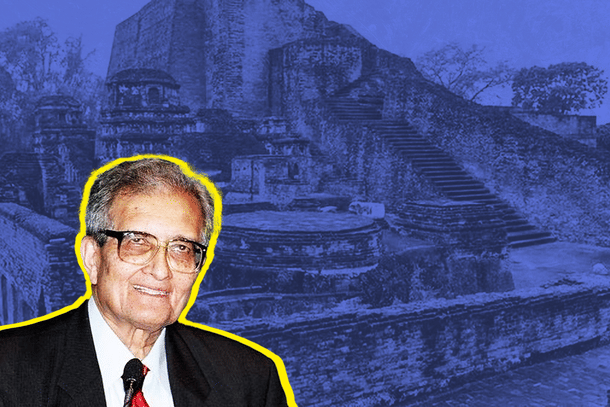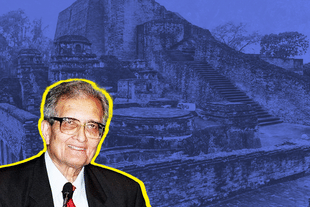Politics
How Amartya Sen Nearly Crippled Nalanda University’s Revival
Abhishek Kumar
Jun 19, 2024, 05:05 PM | Updated Aug 05, 2024, 03:42 PM IST
Save & read from anywhere!
Bookmark stories for easy access on any device or the Swarajya app.


On 19 June 2024, Prime Minister Narendra Modi inaugurated the new campus of Nalanda University (NU) in Rajgir, Nalanda.
The idea for reviving the historic NU was put forward by former President Dr A P J Abdul Kalam in 2006. Nitish Kumar quickly pounced on the idea and provided land for the university on war footing.
The Manmohan Singh government then established a “Nalanda Mentor Group (NMG)” on 28 June 2007. It was tasked with providing governance structure, framework and structure of international cooperation and partnership among others. Amartya Sen was chosen as its head.
Sen’s appointment was controversial from the word go. His views on the Islamic invasion of India effectively created an intellectual shield for the oppressors. Despite that, intellectuals of the day did not raise their voice.
However, the next nine years left an indelible red mark on Sen’s credibility and motives. His antics, spending and appointments were highlighted by the Comptroller and Auditor General of India (CAG) and criticised by Dr Abdul Kalam.
In his July 2011 letter sent to the minister of external affairs (MEA), S M Krishna, Dr Kalam said that posts like chancellor and vice-chancellor should be reserved for persons with extraordinary intellect and management expertise. He also advocated for both of them to be present in Bihar full-time.
Dr Kalam was probably hinting towards Sen holding the meetings for NMG in places like New York, Delhi, Tokyo and Singapore. Sen also paid only customary visits to Nalanda in nearly a decade-long tenure. No wonder, things never really got going during his tenure.
According to the CAG audit, NMG was required to submit final recommendations within nine months of its formation. The apathy was such that even after three years (36 months), ‘mentors’ led by Sen failed to submit the report.
The official response from the Manmohan government was that its terms of reference were extended under Section 8 of the Nalanda University Act, 2010.
Even if we assume that Sen’s actions were legitimised through the Act, there are cases of ignorance, bordering criminal misconduct.
Section 7 of the Act provides for the constitution of the governing board (GB) with defined criteria, while Section 8(1) defines their terms of reference. By and large, GB would be responsible for the policies, direction and management of the university.
In case of failure to appoint GB, Section 8(2) of the act vests this power in NMG led by Sen. NMG — initially supposed to play this role for one year was given continuous extensions by amending the act in 2011, 2012 and 2013 respectively. In fact, the 2013 amendment deleted the timeframe for NMG, giving a free hand to Sen.
NMG headed by Sen took key decisions like the formation of statutes, rules and regulations, and the creation of posts in NU among others between 2010 and 2016.
CAG report highlighted that Sen recommended three names — Gopa Sabharwal, Ramchandra Guha and Pratap Bhanu Mehta for the post of Rector in February 2009. MEA even accepted it and appointed Gopa Sabharwal, a reader in the department of sociology at Lady Sri Ram College.
The problem is that NMG’s terms of reference (TOR) did not contain such recommendations.
In August 2010, the same NMG recommended Gopa Sabharwal (again against TOR) for the post of vice-chancellor. It even proposed a hefty salary of Rs 3.50 lakhs per month along with other allowances for the same. MEA agreed to pay Rs 2 lakhs plus allowances and Sabharwal joined as vice-chancellor on 8 October 2010.
To bypass the TOR conundrum, India's President, who is a visitor of the university confirmed her appointment as vice-chancellor in March 2012, nearly one and half years after her appointment. Even her confirmation date was changed from 8 October 2010 to 25 November 2010, the date on which the Nalanda University Act came into force.
In February 2011, NMG, discharging its duty as governing board increased Sabharwal’s salary to Rs 3.5 lakhs, which Sabharwal herself got reduced to Rs 2.5 lakhs in October. CAG noted that “arbitrary enhancement of approved salary resulted in excess payment of Rs 37 lakhs to the VC during March 2011 to February 2016.”
Under Sen, NMG also appointed Anjana Sharma as an officer on special duty (OSD) on university development. As usual, the act brought to establish NU didn't even provide for such a post.
For a non-statutory and non-constitutional post, Sen recommended paying her Rs 2 lakhs per annum. Both Sabharwal and Sharma were extended the benefit of reimbursement of income tax liability. CAG observed that it cost Rs 57.4 lakhs to the university.
CAG also did not agree with the way in which schools were being established.
"The university failed to establish schools in time and could not start the construction of university campus work," the CAG report revealed.
The report also found the endowment committee to be ineffective.
Seven years after the report, things have changed quite a lot. The dreams of revival have survived the onslaught. More students, more faculties and world-class facilities are new priorities for the administration.
Abhishek is Staff Writer at Swarajya.





